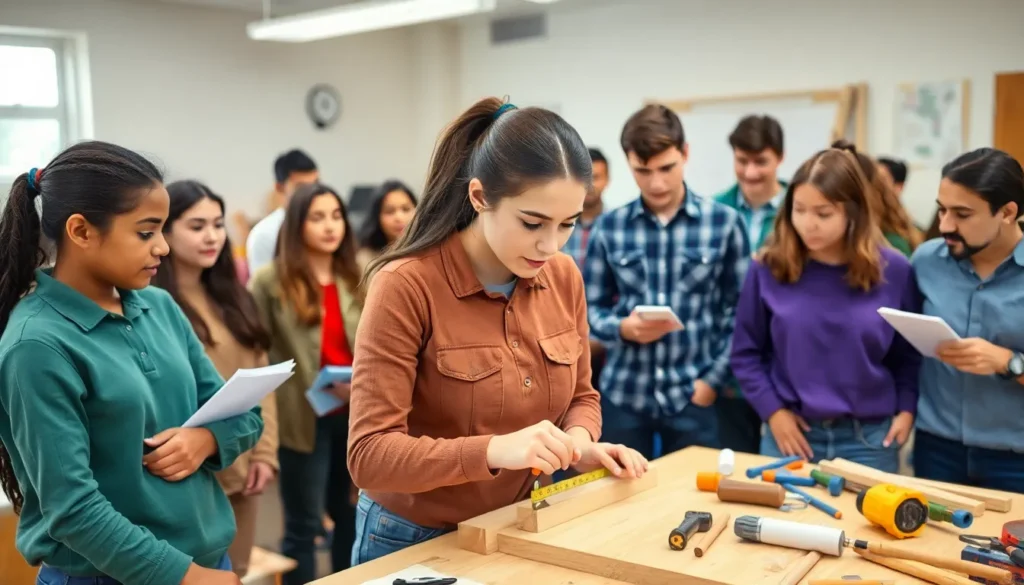In a world where DIY projects often lead to more chaos than construction, building construction classes offer a lifeline. They’re not just for aspiring contractors; they’re for anyone who’s ever thought, “How hard can it be to build a shed?” Spoiler alert: it can be pretty hard. Whether it’s mastering the art of framing or figuring out why that wall keeps leaning, these classes turn confusion into confidence.
Imagine wielding a hammer like a pro while your friends marvel at your newfound skills. With hands-on training and expert instructors, students get to learn the ropes (and maybe even how to tie them). Building construction classes don’t just teach; they empower. So, if you’ve got a vision and a penchant for power tools, it’s time to lay the foundation for your future.
Table of Contents
ToggleOverview of Building Construction Classes
Building construction classes provide essential skills for individuals interested in hands-on projects. Participants learn various aspects of construction, from understanding blueprints to mastering framing techniques. Students engage in practical exercises that enhance their knowledge and empower them to tackle renovation or DIY projects confidently.
Instructors typically possess extensive industry experience, ensuring that they offer valuable insights into real-world applications. Coverage includes fundamental topics such as safety protocols, tool usage, and material selection. Classes often utilize modern technology, enabling students to gain familiarity with the latest construction methods and equipment.
Hands-on training plays a vital role in these courses. Participants receive guided instruction as they practice skills in simulated environments. Learning through doing fosters a deeper understanding of construction principles, preparing students for actual project involvement.
Curriculums may also address structural issues and problem-solving strategies. This training equips students to identify potential challenges and implement effective solutions. Networking opportunities arise as individuals share experiences and insights with peers and instructors.
Varied course offerings cater to different interests and skill levels. Beginner classes focus on foundational skills, while advanced workshops dive deeper into specialized techniques. Those interested in pursuing careers in construction find these courses particularly beneficial for building resumes and enhancing employability.
Ultimately, the variety and depth of building construction classes empower students to pursue their construction-related goals, whether for personal projects or professional aspirations.
Types of Building Construction Classes

Building construction classes come in various formats to suit different learning preferences and schedules. Each type offers unique benefits and opportunities for skill development.
Online Classes
Online classes provide flexibility for students balancing other commitments. Participants can access course materials from anywhere, allowing learning at their own pace. These classes often include video lectures, interactive quizzes, and virtual discussions. Accessing expert instructors happens through live webinars or forums, ensuring support throughout the learning process. Online formats also frequently feature a wider range of topics, giving students chances to explore specialized areas of interest.
In-Person Classes
In-person classes create opportunities for hands-on experience in real-time. Students engage with instructors directly, enhancing the learning process through immediate feedback. These classes emphasize hands-on exercises in a controlled environment, fostering collaboration among peers. Participants often use tools and materials, gaining practical knowledge by working on projects together. Building strong relationships within these sessions can lead to networking opportunities, beneficial for future career aspirations or personal projects.
Hybrid Classes
Hybrid classes combine the benefits of online and in-person learning. Students receive flexibility through online components while also participating in hands-on sessions. This format maximizes learning opportunities, as learners can practice skills in person after completing online lessons. Hybrid classes cater to various learning styles, accommodating those who thrive on self-paced study as well as those who prefer face-to-face interaction. Adopting this model allows for a richer educational experience and enhances skill retention.
Curriculum and Course Content
Building construction classes offer a comprehensive curriculum designed to equip students with the necessary skills for various construction projects.
Core Subjects
Students engage with core subjects that form the foundation of building construction knowledge. Topics include blueprint reading, framing techniques, and structural integrity assessments. Safety protocols play a crucial role in these classes, ensuring students learn the importance of personal and site safety. Practical tool usage is emphasized, allowing participants to become proficient in handling equipment. Addressing common construction challenges also forms part of this core curriculum. By mastering these subjects, students gain confidence in executing construction tasks effectively.
Elective Courses
Elective courses provide opportunities to specialize in certain areas of interest. Options may include sustainable building practices, advanced masonry, or project management. Each elective course enhances skills relevant to specific construction fields. Students can explore emerging trends, like green technology in building design, or delve deeper into specialized techniques such as electrical systems installation. These courses allow for customization of learning paths, enabling students to align their education with personal goals or career aspirations. Elective offerings ensure a well-rounded educational experience in building construction.
Benefits of Taking Building Construction Classes
Building construction classes offer numerous benefits, fostering essential skills for both personal projects and professional growth.
Skill Development
Participants gain practical skills through hands-on training. Learning about blueprints, framing techniques, and structural integrity forms the foundation of their education. Instructors with industry experience provide valuable insights that enhance understanding. Students practice in simulated environments, allowing for application of concepts in real-world scenarios. Problem-solving strategies are integrated into the curriculum, equipping individuals to identify and address construction challenges. Engaging in these classes cultivates confidence in one’s abilities and encourages further exploration of construction.
Career Advancement
Career advancement opportunities increase significantly for those who complete building construction classes. Employers often seek candidates with specialized skills and knowledge in the industry. Completing these courses differentiates candidates in a competitive job market. Networking opportunities arise within classes, connecting students with professionals who can offer mentorship or job leads. Additionally, elective courses allow for specialization, which can align educational experiences with specific career goals. Knowledge gained from these classes enhances resumes and demonstrates a commitment to continuous learning.
Finding the Right Building Construction Classes
Selecting suitable building construction classes involves examining various elements, including accreditation, certification, and instructor qualifications.
Accreditation and Certification
Accreditation ensures that programs meet industry standards, providing students with quality education. Students should verify whether a class is accredited by a recognized organization, such as the National Center for Construction Education and Research (NCCER). Certification from a reputable body also enhances credibility, demonstrating to employers that participants possess essential skills. Industry-recognized certifications often represent a commitment to professional development, leading to greater job opportunities. Individuals can pursue courses that culminate in recognized certifications, thereby increasing confidence in their qualifications and employability.
Instructor Qualifications
Instructors play a critical role in delivering effective building construction programs. Experienced professionals not only bring real-world expertise but also provide valuable insights into the construction field. Evaluating an instructor’s background is essential; those with significant industry experience often teach practical applications and current trends. Additionally, instructors should possess relevant certifications, showcasing their commitment to continuous learning and professional development. Engaging with knowledgeable instructors enhances the educational experience, guiding students to develop skills necessary for tackling complex projects and achieving their construction-related goals.
Building construction classes serve as a transformative experience for anyone eager to enhance their skills. With a focus on practical training and expert guidance, these programs empower students to take on construction projects with confidence. The variety of formats available ensures that everyone can find a suitable option to fit their learning style and schedule.
By investing time in these classes, individuals not only gain essential skills but also open doors to new career opportunities. The knowledge acquired can significantly boost employability and demonstrate a commitment to personal and professional growth. Engaging with experienced instructors and fellow students fosters a supportive community that encourages collaboration and networking. Ultimately, these classes lay the groundwork for success in the dynamic field of construction.





